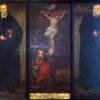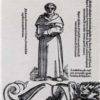Tag: Kerygmatic
A Kerygmatic Anthropology
Knowledge of ourselves first requires a genuine knowledge of the One who created us. Without that outer reference point, there can be no genuine knowledge of the self. This was a key axiom of Calvin’s, as he wrote in his Institutes; and it is key for Barth as he developed his theological anthropology in the Church Dogmatics. The following is an excerpt from Barth’s CD III/2, where he is, indeed, doing the yeoman’s work of developing what he takes to be a genuinely Christian understanding of what the entailments are of what it means to be human. You will notice,…
The Lutheran Connection with TF Torrance: The Kerygmatic Christ as the Concentration
The Gospels of the New Testament witness all present Jesus via His historicity, and the facts of His life as they unfolded in particular frames of reference. John the evangelist ended his Gospel with the quip, “And there are also many other things that Jesus did, which if they were written one by one, I suppose that even the world itself could not contain the books that would be written. Amen.” Clearly, Jesus was a historical personage, but this is not how the Christian has come to know Him at a first order; nor is it the way that the Evangelists…
Luther’s Kerygmatic God Versus the Speculative god of the Thomists
The Christian world needs a revival! It needs to come to a genuine knowledge of God. Not a speculative knowledge, as those retrievers of Aquinas would have it; but a concrete known knowledge of God gifted to us in God’s Self-exegesis in Jesus Christ. When God becomes a predicate of a notional ‘godness’ that ‘we’ (think the philosophers) connive, God simply becomes a projection of our own faces (Ludwig Feuerbach knew this well). But this is the God that the evangelical Reformed types these days are introducing people to. Not the God of the Bible revealed in Jesus Christ, but…
The Lutheran Connection with TF Torrance: The Kerygmatic Christ as the Concentration
The Gospels of the New Testament witness all present Jesus via His historicity, and the facts of His life as they unfolded in particular frames of reference. John the evangelist ended his Gospel with the quip, “And there are also many other things that Jesus did, which if they were written one by one, I suppose that even the world itself could not contain the books that would be written. Amen.” Clearly, Jesus was a historical personage, but this is not how the Christian has come to know Him at a first order; nor is it the way that the Evangelists…



